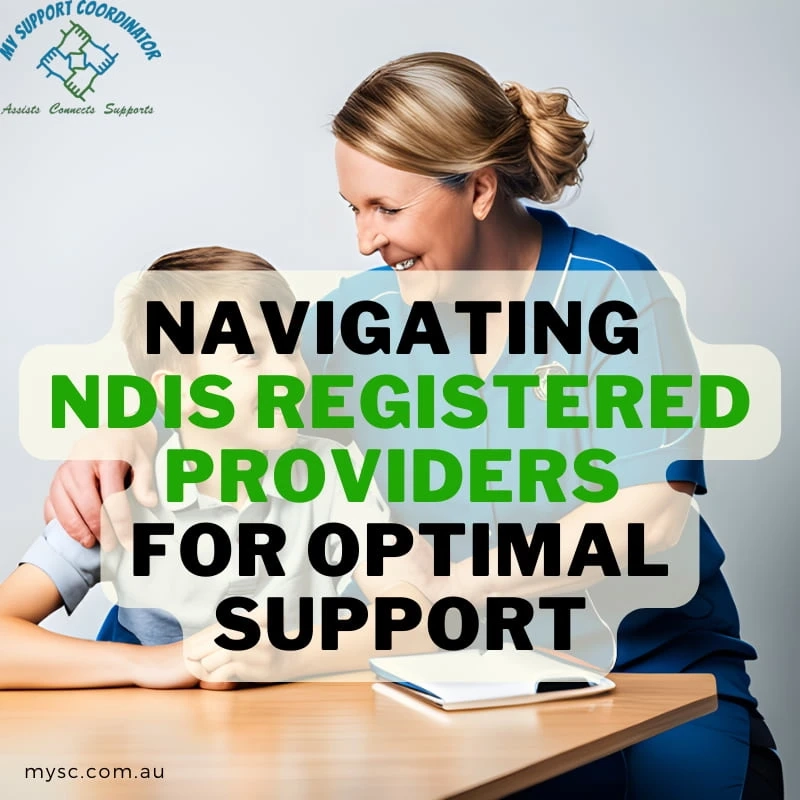Introduction
In the National Disability Insurance Scheme (NDIS), choosing the right registered provider for your needs is an important choice that has a significant impact on the quality of your care. With this comprehensive guide, we explore the crucial importance of choosing the right NDIS registered provider and provide you with a step-by-step guide to ensure an informed decision. By the end of this guide, you will have gained a comprehensive understanding of what NDIS registered providers do.
This includes insight into the array of support coordination services they offer, such as “NDIS support coordination” and “NDIS support coordinator,” benchmarks to consider during your comparative assessment, and practical tips on aligning your NDIS plan with the support you receive.
The Role and Significance of NDIS Registered Providers
NDIS registered providers play a pivotal role in assisting NDIS participants in achieving their goals and accessing the support they require. These providers, whether organizations or individuals, have undergone a rigorous evaluation process by the NDIS Commission to ensure they meet stringent quality and safety standards. Choosing a registered provider brings several advantages for participants. It signifies that the provider possesses the necessary qualifications, experience, and ethical standards to deliver dependable and effective support.
Exploring NDIS Support Coordination Services
NDIS support coordination services are designed to empower participants in navigating the complexities of the NDIS and realizing their goals. Several categories of support coordination services are available to cater to diverse participant needs:
Support Connection: This service focuses on enhancing participants’ capacity to manage their NDIS plans independently. Support coordinators aid participants in comprehending and implementing their plans, connecting with service providers, and accessing community resources.Support Coordination: With this service, support coordinators take an active role in helping participants execute their NDIS plans. They provide ongoing guidance, assist with plan management, and coordinate services from multiple providers.Specialist Support Coordination: Tailored for participants with intricate needs, this service involves highly specialized support. Specialist support coordinators possess expertise in navigating complex service systems, ensuring participants’ unique requirements are met effectivelyStep-by-Step Guide to Selecting Your Ideal NDIS Support Coordinator
When comparing NDIS registered providers, a thorough evaluation process ensures that you choose the best fit for your needs. Follow these steps to make an informed decision:
Research: Begin by researching a range of NDIS registered providers to understand their services and offerings.Seek Recommendations: Reach out to peers, support networks, and NDIS participants who have experience with various providers for insights and recommendations.Contact Providers: Engage in direct communication with potential providers to gather information about their services, approach, and values.Review Policies and Agreements: Carefully review provider policies, agreements, and terms to ensure they align with your preferences and goals.Evaluate Compatibility: Consider whether the provider’s values, cultural sensitivity, and approach align with your expectations and needs.Read Client Reviews: Gain insights from client reviews and testimonials to understand the provider’s track record and client satisfaction.Ask Questions: Pose essential questions to providers to gauge their expertise, approach, and ability to meet your specific requirements.Making an Informed Decision: Practical Tips
While price is a factor, it’s crucial to consider various aspects beyond cost when making your final decision:
Look Beyond Price: Prioritize value and quality over cost alone.Assess Rapport and Communication: Evaluate the provider’s communication style and rapport-building skills.Verify Organizational Stability: Ensure the provider is established and stable in their operations.Seek Feedback: Gather feedback from others who have engaged with the provider to understand their experiences.Check Credentials and Qualifications: Verify the provider’s qualifications and expertise in offering relevant services.Evaluate Service Agreements: Thoroughly review service agreements to ensure they align with your expectations.Trust Your Instincts: Listen to your instincts and choose a provider with whom you feel comfortable and confident.Consider Accessibility: Confirm the provider’s accessibility and availability to meet your support needs.Conclusion
Selecting the right NDIS registered provider is a pivotal decision that directly influences the support and services you receive under the NDIS. This comprehensive guide has illuminated the significance of this choice and provided a structured approach to help you make an informed decision.
By understanding the role of NDIS registered providers, exploring the array of support coordination services, and following the step-by-step selection process, you can ensure that your chosen provider aligns seamlessly with your goals and aspirations. Remember, making an informed decision empowers you to access the support you need to thrive within the NDIS framework.


